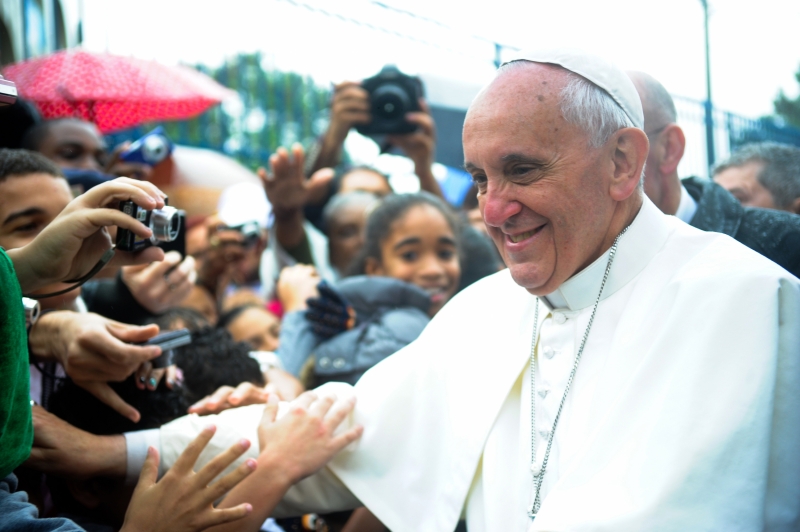With the Pope’s recent and first ever visit to the U.S., we were all saturated with massive amounts of media coverage.
As a New Yorker, it was virtually impossible to avoid the hoopla and mounting excitement. Everywhere I went there was evidence of the auspicious occasion. From steel rails to concrete road blocks, heavily increased police presence, merchandise for sale, newspaper covers and many overheard conversations about whether or not one was in possession of a highly coveted “viewing ticket.”
To be totally honest, my main concern was whether or not my commute would be affected; I was mildly apathetic about it all. I am not a Catholic and while I respect and admire this new Pope immensely, I was not relating to his upcoming proximity in any kind of personal way.
On Friday, it just so happened that he was going to be driving down the street I work on and it seemed silly not to step outside and join the thousands of others that had lined up for hours to simply catch a glimpse of him in the back seat of his now famous black Fiat. So I joined in and found myself enjoying the connection with people and the positive energy emanating from the crowd. It was powerful and palpable and had me wondering:
What is it about this man that moves people from all walks of life so deeply?
Well, it’s pretty obvious…
The Pope gives hope, and that is not small change.
Hope is arguably the single biggest commodity that the Pope offers. Just look at the photos and footage of the sobbing, the sick, the wounded, the children, the elderly, the screaming “Beatlemania effect” that he induces and you will have your proof.
Recipients of his touch feel blessed for life. He kisses the head of a sick child and the parents are profoundly relieved and grateful. He takes the hand of an elderly person and they claim it to be the best moment of their life. Just a mere glimpse of him gives people a sense of grace and blessed opportunity.
The Pope gives hope because he is thought to be {by his followers} spiritually closer to God than any other mortal; God’s Vicar is a pretty powerful robe to wear.
The paradox.
Hope is a uniquely human and wondrous thing. It can be a great motivator; it can inspire us, bring out the best in us and keep us going in the worst of times.
But it’s also a double edged sword and the dark side of it arises when people use it as a crutch, an excuse for inaction or, place it where it doesn’t {realistically} belong; attaching it onto something not likely to ever happen.
Hope’s true value lies in its connection to possibility.
When hope is attached to an unlikely or impossible outcome it prevents us from moving forward in our life. It has a tendency to feed on itself and exponentially grow to obsessive proportions. This relentless obsession propels us to devise all kinds of scenarios for getting what we want often to the great detriment of other important aspects of our life.
We’ll remain stuck in thoughts of lack and scarcity. We despair because we don’t yet have what it is we’re hoping for. We become blocked to inner calm and peace. Joy and happiness are fleeting at best because our focus is far from the present moment. In essence, unrealistic hope keeps us operating out of fear.
Time and time again I see this with my clients after a painful break-up. They suffer so much gut wrenching emotion and cling to hope for some sort of reconciliation. Often this is the only thing that keeps them going.
Hope, even when we intuitively know it’s “the impossible dream,” feels comforting, friendly and familiar. It’s our “go to” emotion when we feel pain and suffering. The alternative, staying in the present moment with our pain, is usually too much for us to bear. So we time travel to “hopeland” where we feel that things will surely be better.
Unfortunately, when it relates to impossible outcomes, this is simply nothing more than false hope and time wasting, life sucking delusion.
To let go of false hope we need to learn the art of acceptance. Acceptance is the answer to living a turbulent free life. When we don’t accept what is, we struggle.
It really is that simple. It’s not easy and it takes practice, but it is that simple.
We cultivate acceptance by learning to be in the present moment and we learn present moment awareness by allowing our experiences, emotions, thoughts, feelings and sensations to process through us as they are happening. To do this, we must surrender into a practice of sitting in the fire; sitting with the uncomfortable stuff and not turning away with our distracting and numbing habits.
The here and now is what is real and once we begin to fully understand this, acceptance, even of the things we didn’t want, becomes possible.
“Life is a series of natural and spontaneous changes. Don’t resist them; that only creates sorrow. Let reality be reality. Let things flow naturally forward in whatever way they like.” ~ Lao Tzu
Relephant:
Thou Shalt Not Destroy the Earth: Pope Francis & Climate Change.
Author: Debra Faith Warshaw
Editor: Renée Picard
Image: Wiki Commons









Read 0 comments and reply